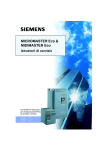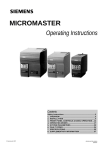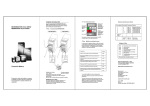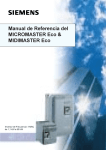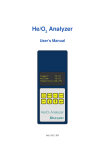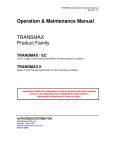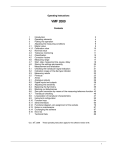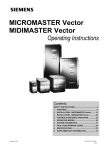Download MICROMASTER Eco & MIDIMASTER Eco Operating Instructions
Transcript
MICROMASTER Eco & MIDIMASTER Eco Operating Instructions Frequency Inverter from 0.75kW to 315kW for Fans and Pumps CONTENTS Section 1 Safety and CE Compliance…………………. 2-3 Section 2 Introduction…………………………………… 4 Section 3 Mechanical Installation……………………… 5 Section 4 Electrical Installation………………………… 6-7 Application Examples……………………….. 8 Keypad…………………………………………. 9 Section 5 EG Section 6 Section 7 DM Display Mode Parameters……………….….. 10 Section 8 BM Basic Mode Parameters………………….…. 10-11 Section 9 EM Expert Mode - Important Parameters…...… 12-15 Section 10 P Parameter Listing……………………….……. 16-17 Section 11 Fault Codes…………………………….……… 18 Section 12 Your Parameter Settings……………………. 19 SAFETY AND CE COMPLIANCE ..................................... Before installing and putting this equipment into operation, read these safety instructions and warnings carefully. Also read and obey all the warning signs attached to the equipment. Make sure that the warning labels are kept in a legible condition and replace any missing or damaged labels. WARNING This equipment contains dangerous voltages and controls dangerous rotating mechanical parts. Loss of life, severe personal injury or property damage can result if the instructions contained in this manual are not followed. Only suitably qualified personnel should work on this equipment, and only after becoming familiar with all safety notices, installation, operation and maintenance procedures contained in this manual. • Use only permanently wired input power connections. The equipment must be grounded (IEC 536 Class 1, NEC and other applicable standards) • Use only Residual Current-operated protective Device (RCD) type B if an RCD is required • Wait at least five minutes after the power has been turned off, before opening the equipment. The dc-link capacitor remains charged to dangerous voltages even when the power is removed. When working on open equipment, note that live parts are exposed and do not touch these parts • Do not connect machines with a threephase power supply, fitted with EMC filters, to a supply via an ELCB (Earth Leakage Circuit Breaker - see EN50178, section 6.5) • Note that certain parameter settings may cause the inverter to restart automatically after an input power failure • Do not use this equipment as an “emergency stop” mechanism (see EN 60204, 9.2.5.4) • Obey all general and regional installation and safety regulations relating to work on high voltage installations, as well as regulations covering correct use of tools and personal protective equipment 2 • Note that the following terminals can carry dangerous voltages even when the inverter is inoperative: Power supply terminals L/L1, N/L2 and L3 Motor terminals U, V and W Additional terminals MICROMASTER Eco B+/DC+ and BMIDIMASTER Eco DC+ and DC• This equipment is capable of providing internal motor overload protection in accordance with UL508C section 42. Refer to P074. Motor overload protection can also be provided by using an external PTC. • This equipment is suitable for use in a circuit capable of delivering not more than 100,000 symmetrical amperes (rms), for a maximum voltage of 230 / 460 V * when protected by a time delay fuse *. * As detailed in the Eco Reference Manual. • Do not use the unit with a motor of a higher nominal power rating than the inverter, or a nominal power less than half that of the inverter. Only operate the inverter when the nominal current in P083 exactly matches the motor rating plate nominal current • Enter the motor data parameters (P080P085) and do an auto-calibration (P088) before the motor is started. Unstable/unpredictable motor operation (e.g. Reverse rotation) may result if this is not done. If this instability occurs, the mains supply to the inverter must be disconnected. • When using the analog input, the DIP switches must be correctly set and the analog input type selected (P023) before enabling the analog input with P006. If this is not done the motor may start inadvertently. • Lowering the fan tray on Frame size C MICROMASTER Eco exposes rotating parts. Power must be isolated prior to this operation. .......................................................................................... CAUTION • Do not allow children or the general public to access or approach this equipment • Keep operating instructions within easy reach and give them to all users • Do not install the inverter where it will be subject to shock, vibration, electro-magnetic radiation, water hazards, or atmospheric pollutants such as dust or corrosive gases • Use this equipment only for the purpose specified by the manufacturer. Do not carry out any modifications, or fit any spare parts, which are not sold or recommended by the manufacturer; this could cause fires, electric shock or other injuries. • High voltage insulation test equipment must not be used on cables connected to the Eco. EUROPEAN LOW VOLTAGE DIRECTIVE The MICROMASTER Eco and MIDIMASTER Eco product range complies with the requirements of the Low Voltage Directive 73/23/EEC as amended by Directive 93/68/EEC. The units are certified for compliance with the following standards: EN 60146-1-1 Semiconductor convertersGeneral requirements and line commutated converters EN 60204-1 Safety of machineryElectrical equipment of machines EUROPEAN MACHINERY DIRECTIVE The MICROMASTER Eco and MIDIMASTER Eco product range do not fall under the scope of the Machinery Directive. However, the products have been fully evaluated for compliance with the essential Health & Safety requirements of the directive when used in a typical machine application. A declaration of incorporation is available on request. EUROPEAN EMC DIRECTIVE When installed according to the recommendations described in this manual, the MICROMASTER Eco and MIDIMASTER Eco product range fulfil the requirements of the EMC Directive as defined by the EMC Product Standard for Power Drive Systems EN 61800-3 UL and CUL listed power conversion equipment type 5B33 for use in pollution degree 2 environment ISO 9001 Siemens plc operates a quality management system which complies with the requirements of ISO 9001. 3 INTRODUCTION ............................................................... GENERAL These are the Operating Instructions for the MICROMASTER Eco and MIDIMASTER Eco and are to be used for quick and simple commissioning only. For more details and the complete parameter list for specific applications consult the Eco Reference Manual on our website (details available on back page). The Eco range of inverters comprises variable frequency inverters for controlling the speed of fans and pump motors. The Eco can also be programmed to manage many other motor functions and limits. These functions are set by parameters which are programmed using the keypad. TYPES OF SYSTEM CONTROL The MICROMASTER and MIDIMASTER Eco inverters are normally controlled using the keypad or input/output terminals. However, there is an option for remote operation using the RS485 D-type connection on the front panel, see the Eco Reference Manual for further details. The output frequency and hence the motor speed can be controlled by digital or analog inputs. The digital inputs can be programmed to control the motor speed by means of: • frequency set points, using the keys • fixed frequencies, via binary inputs • motorized potentiometer function The analog inputs can be programmed for voltage or current input in conjunction with DIP selector switches. Closed loop process control, using a standard Proportional, Integral, Derivative (PID) control loop function can be selected. This control is set-up using DIP selector switches and analog input 2. A 15V, 50 mA supply is provided to power the feedback transducer. 4 MECHANICAL INSTALLATION ....................................... MOUNTING The IP20/21 range of Eco units can be mounted side-by-side without space in between. A clearance distance of at least 100mm top and 160 mm bottom must be left free for the movement of cooling air. IP56 Eco units must have a clearance distance of at least 150mm in all directions. A good bonding between the Eco and the metal back plate is necessary to ensure good grounding and low RF (radio frequency) impedance. If necessary remove some back plate paint and/or use toothed washers to ensure safety and EMC (electro-magnetic compatibility). Use an earth braid on 400V ratings 1.5KW and below. Ambient temperature MICROMASTER Eco 0oC to 50oC. MIDIMASTER Eco (IP20/21/56) 0oC to 40oC. Ensure that the Eco is not subject to shock, vibration or atmospheric pollutants. MOTOR CABLES To minimise the effects of radio frequency emissions:• Screened cables should be used between the Eco and the motor. • Keep cables to motor as short as possible, generally under 25m. • Terminate cable screens correctly (use gland fittings which give 360 deg. conduction) on both the Eco gland plate and the motor terminal box. • Fit suppressors on all contactor coils. • If an external input EMC filter is to be fitted then ensure that it is positioned as close as possible to the Eco and is well grounded to the metal back plate. Use screened cable between the external input EMC filter and the Eco input terminals, and ground cable screen correctly. All MICRO/MIDIMASTER Eco products comply with the requirements of the EMC Directive when installed in accordance with the wiring recommendations of this manual. The units comply with European Norm EN61800-3 “Adjustable speed electrical power drive systems”. This standard specifies different limits for domestic and industrial applications, which defines whether an integral EMC filter is required. For further information refer to the Eco Reference Manual. When units are selected which include integral filters they will meet the conducted and radiated RF emissions limits specified in EN 55011. CONTROL AND SERIAL COMMUNICATION CABLES To minimise the effects of radio frequency emissions and interference:• Screened control and data cables should be used with the Eco. • Terminate the control and data cable screens correctly on the Eco by using the gland plate and/or clamps provided. Consult the instructions for the Building Management System or controller at the opposite cable end. • IT IS MOST IMPORTANT THAT THE MOTOR AND CONTROL CABLES ARE KEPT APART. IF CONTROL AND POWER CABLES NEED TO CROSS, ARRANGE THE CABLES SO THAT THEY CROSS AT 90° IF POSSIBLE. CIRCULATING CURRENTS If there is a slight difference between the chassis potential of the Eco and the Building Management System (or controller) then circulating currents can occur in the control or data cable screens. These circulating currents should be avoided by separately connecting the chassis of both pieces of equipment securely to the same earthing point. 5 ELECTRICAL INSTALLATION ......................................... DIP Switch's Control Terminals CONNECTING TO MAINS Terminals L/L1, N/L2 & L3 Ensure that the nameplate voltage of the Eco (and the motor) corresponds to the mains supply voltage to be used. PE L/L1 N/L2 Check that the supply circuit protection is correctly rated for the Eco nameplate input current. L3 Ensure that all power cables are adequately rated for the expected duty. Input Supply Terminals PE U V W CONNECTING TO MOTOR Terminals U, V, & W Only use the Eco with fan or pump motors (variable torque). Motor Terminals MICROMASTER Eco - Mains supply, motor and control connections FS7 units L1 L2 L3 U V W DIRECTION OF ROTATION The direction of rotation of the motor can be reversed by changing over two of the output connections on the Eco. PE DC- DC+ PE FS6 units L1 L2 L3 U V PE U V W x x x x W M FS4/5 units L1 L2 L3 PE PE DC- DC+ U V W PE U V W x x x x Power and Motor terminals MIDIMASTER Eco - Power and motor connections. 6 M Make sure that the Eco is securely mounted. NOTE For 110kW to 315kW units the mains supply terminals are at the top, and the motor connection terminals are at the bottom. The power cable screen and control wiring screen must be connected to the inverter gland plate. ELECTRICAL INSTALLATION......................................... MIDIMASTER A1 OUT+ MICROMASTER A OUT+ P10+ 0V 1 2 AIN+ AIN3 DIN1 DIN2 DIN3 DIN4 P15+ PIDIN+ PIDIN- 4 5 6 7 8 9 10 11 AOUT- PTC 12 13 PTC 14 DIN5 DIN6 15 16 17 18 19 20 RL1A RL1B RL1C (NC) (NO) (COM) Micromaster Analog Output Midimaster Analog Output 1 0/4....20 mA (500Ω load) Power Supply (+10 V, max. 10mA) Digital Inputs (7.5....33 V, max. 5mA) Analog Input 1–10 V Analog to+10 V Input 1 0/2… 10V -10 V to +10 V (Input impedance 70kΩ) 0/2 .... 10V or (input impedance 70kΩ) or 0/4….20mA 0/4 .... 20mA (Resistance = (Resistance 300Ω) = 300Ω) Analog input2 0 .... 10 V or 0 .... 20mA Power Supply for PID Feedback Transducer (+15V, max. 50mA) Digital Inputs (7.5 ....33 V, max 5mA) Motor temp. protection input Note: For PTC motor thermal protection, P087 = 1 Output Relays (RL1 and RL2) max. 0.8 A/230V AC (Overvoltage cat.2) 2.0 A/30 V DC (resistive rating) A2OUT+ 21 RL2B (NO) 22 23 24 25 26 P5V+ N- P+ PE 27 RL2C (COM) MIDIMASTER Eco RS485 RANGE (for USS protocol) Analog Output 2 0/4 ....20 mA (500Ω load) use with terminal 13 5 1 9 6 OV Output Relays (RL1 and RL2) max. 0.8 A/230V AC (Overvoltage cat.2) 2.0 A / 30 V DC (resistive rating) P+ N- PE (case) 5V (max. 250mA) Front Panel RS485 D-type 21 RL2B (NO) 22 23 24 25 26 PE N- P+ P5V+ RL2C (COM) MICROMASTER Eco RANGE RS485 (for USS protocol) 7 APPLICATION EXAMPLES .............................................. FAN CONNECTION PUMP CONNECTION L1 L2 L3 N PE L1 L2 L3 N PE F1 F1 PE PE L1 L2 L3 PE U V L2 9 L3 A A 5 Eco 5 1 Eco EG L1 9 B 3 PE U V 3 4 W 0-20mA C 2 4 W M 3~ Pump Fan M 3~ Typical fan connection To speed control a fan between 0-50 Hz, (60 Hz in North America) a potentiometer is used or 0-10V speed setting signal. DIP Switch Configuration • • • • • Typical pump connection To control the speed of the pump in a pumping system a 0-20 mA control signal is used; this corresponds to a 0-100% motor speed normally 0-50 Hz (60 Hz in North America). A signal representing the output frequency is required, i.e. as an indication of the motor speed. An analog output (terminals 12 & 13) of 0-20 mA is used, which corresponds to a frequency of 0-50 Hz (60 Hz in North America). DIP Switch Configuration • • • P006=1, P007=0 (Basic mode Parameter changes from factory default) A B C 8 External switch or relay, contact Potentiometer or 0-10 V signal Speed control signal • • KEYPAD ........................................................................... STOP Button RUN Button LED Display UP / INCREASE speed PARAMETER RANGES The Eco has three ranges of parameters; Display mode, Basic mode and Expert mode. One of the Basic mode parameters (P199) controls access to the Expert mode parameters. The Basic mode parameters are described in this section. A list of the Expert mode parameters is contained in the next section. For further information on using Expert mode, refer to the Reference Manual. I O P ACCESSING PARAMETERS AND CHANGING VALUES DOWN / DECREASE speed RS485 Interface Parameterisation Button THE KEYPAD The keypad comprises membrane-type keys as well as an integral 4-digit 7-segment LED display. The keys are limited to [run], [stop], [up], [down] and [P]. All parameters can be accessed and changed using the keys. The and keys are used to change parameter values. The keys have two modes of operation. A single momentary press will change the value by a value of 1. Keeping the button pressed for longer initiates scrolling and allows values to be changed rapidly. To access a parameter and change its value, follow the simple sequence described below: Key P There are three types of parameter: 2 Limited range parameters. The values themselves are not relevant and only represent the function required. For example, parameter P199 can only be set to 0 to 1. Setting the value to 0 tells the Eco to give access to the basic parameters only. Setting the value to 1 gives access to the expert parameters. 3 ‘Read only’ parameters. The values of these parameters are factory set and provide the user with information. For instance, parameter P111 is a read only parameter and indicates the inverter’s variable torque power rating in kW. Display Press P to enter parameter mode Use the [up] and [down] keys to select the required parameter number (e.g. ramp-up time) PARAMETER TYPES 1 True value parameters. For example, setting parameter P003 to 10 seconds tells the Eco to take 10 seconds to slow the motor from its normal operating speed to stopped (ramp-down time). Action P Press P to confirm that you wish to enter a value for that parameter. The current value is displayed Use the [up] and [down] keys to enter the required value P Press P to confirm that you have changed the value as required. The parameter number is redisplayed. Use the [up] and [down] keys to return the parameter number to the display default parameter. P Press P to return to default display The display will alternate between the setpoint frequency and actual output frequency, which will be 0 Hz. 9 DISPLAY MODE PARAMETERS...................................... Parameter Function Range Default Units Operating display - (output frequency) Hz Displays the output selected by P001 (an Expert mode parameter). Display selection via P001: 0 = Output frequency (Hz) 1 = Frequency setpoint (i.e. speed at which inverter is set to run) (Hz) 2 = Motor current (A) 3 = DC-link voltage (V) 4 = Motor torque (% nominal) 5 = Motor speed (rpm) 6 = USS serial bus status (Code) 7 = PID Feedback signal (%) 8 = Output voltage (V) The default setting (0) displays the inverter output frequency. If the inverter is in stand-by mode, the flashing display will alternate between the setpoint frequency and actual output frequency, which will be 0 Hz when not being run. In the event of a failure, the relevant fault code (Fnnn) is displayed. BASIC MODE PARAMETERS……………………………… Parameter DM Function Range Default Units Ramp-up time 0 - 150.0 20 Seconds This is the time taken for the motor to accelerate from standstill to the maximum frequency. The maximum frequency is set by parameter P013. Setting the ramp-up time too short can cause the inverter to trip (Fault code F002 = overcurrent). Ramp-down time 0 - 150.0 20 Seconds This is the time taken for the motor to decelerate from maximum frequency to standstill. The maximum frequency is set by parameter P013. Setting the ramp-down time too short can cause the inverter to trip (Fault code F001 = DC link overvoltage). This is also the period for which injection braking is applied, if selected (refer to parameter P073 in Expert mode). Frequency setpoint source selection 0–2 0 - The value of this parameter (0, 1 or 2) selects the mode of control of the inverter’s frequency setpoint. 0 = digital motorised potentiometer. The inverter runs at the frequency set in P005 (refer to Expert mode) and can be controlled with the [up] and [down] keys. If P007 (see below) is set to 0, the frequency can be increased or decreased by setting any two of the digital inputs (P051 to P055 or P356 - refer to Expert mode) to the values of 11 and 12. 1 = Analog. The inverter output frequency is controlled by analog input signals (0-10V, 0/420mA or potentiometer). 2 = Fixed frequency. Fixed frequency is only selected by setting the value of at least one of the digital inputs (P051 to P055 or P536 - refer to Expert mode) to the value of 6 or 7. 10 BASIC MODE PARAMETERS.......................................... Parameter Function Range Default Units Keypad control 0 or 1 1 - The value of this parameter (0 or 1) configures keypad control. 0 = Control is by digital inputs (P051 to P055 or P356 - refer to Expert mode) 1 = Front panel (keypad) control enabled. However, the level of control enabled from the keypad is determined by the values of P121 to P124 (refer to Expert mode). Minimum motor frequency 0.0- 150.0 0.00 Hz This value sets the minimum motor frequency and must logically be less then the value of P013 (see below Maximum motor frequency 0.0- 150.0 50,00 (60.00 = North Hz America) This value sets the maximum motor frequency. To maintain stable operation, this value should not exceed 3x the motor rating plate nominal frequency (see below). Start on the fly 0 or 2 0 Flying restart P016=0 Flying restart disabled P016=2 Flying restart enabled Allows the inverter to start onto a spinning motor. Always enter the correct motor nameplate details when enabling this feature. * Motor rating plate nominal frequency 0 - 150.00 50.00 Hz 60,00 (North America) * Motor rating plate nominal speed 0 – 9999 Depends on inverter RPM rating * Motor rating plate nominal current 0.1 - 590.0 Depends on inverter A rating * Motor rating plate nominal voltage 0 – 1000 Depends on inverter V rating * Motor rating plate nominal power 0.12 - 400.0 Depends on inverter kW rating (hp - North America) BM * Parameters P081 to P085 - Notes - These parameters must be set for the particular motor being controlled by the inverter. You must use the data provided on the motor’s rating plate. - Perform an automatic calibration (P088 = 1 - refer to Expert mode) if any of the parameters P081 to P085 are changed from their factory default settings. - When the inverter is set-up for North America operation (P101 = 1 - refer to Expert mode), P081 will default to 60 Hz and P085 will indicate in hp (range = 016 to 530). Access to Expert mode 0 or 1 - - This value enables or disables access to Expert mode parameters. 0 = Normal mode parameter values only can be changed. 1 = Expert mode parameter values can be changed in addition to the Normal mode parameters. It is possible to reset all parameter values (including motor data, P081 to P085) to their factory default settings using Expert parameter P944=1. 11 EXPERT MODE - IMPORTANT PARAMETERS .............. The Expert Parameters shown below are the more frequently used Expert Parameters. Consult the Eco Reference Manual for the full parameter set. CAUTION • Consult the Reference manual before changing an Expert Parameter Parameter Function Range (Default) Display Mode 0-8 [0] Display selection: 0 = Output frequency (Hz 1 = Frequency setpoint (i.e. speed at which inverter is set to run)(H) 2 = Motor current (A) 3 = DC-link voltage (V) 4 = Motor torque (% nominal) 5 = Motor speed (rpm) 6 = USS serial bus status (Code) 7 = PID Feedback signal (%) 8 = Output voltage (V) Notes: The display can be scaled via P010 Automatic restart after mains break 0-1 [1] 0 = No re-start after mains break - run signal must be re-generated 1 = Automatic re-start after mains break if run signal is present Automatic restart after fault 0-1 [0] Automatic re-start after fault: 0 = Disabled 1 = The inverter will attempt to start up to 5 times after a fault. If fault is not cleared after the 5th attempt, the inverter will remain in the fault state. DM 12 10 Description/Notes WARNING: This means that a start is pending and may happen at any time. Fault codes can be observed in P930. Analog input 1 type 0-2 [0] Sets analog input type for analog input 1, in conjuncture with the settings of the DIP selector switches 1, 2 and 3: 0 = 0V to 10V/0 to 20 mA Unipolar input 1 = 2V to 10V/4 to 20 mA Unipolar input 2 = 2V to 10V/4 to 20 mA Unipolar input with controlled start/stop when using analog input control. Motor starts when > 2V. 2nd Skip frequency (Hz) 0-150.0 [0.0] A skip frequency can be set with this parameter to avoid the effects of mechanical resonance. Frequencies within +/-2Hz (value of P019) of this setting are suppressed. Stationary operation is not possible within the suppressed frequency range - the range is just passed through. 3rd Skip frequency (Hz) 0-150.0 [0.0] See P027 4th Skip frequency (Hz) 0-150.0 [0.0] See P027 EXPERT MODE - IMPORTANT PARAMETERS .............. Parameter Function ** Description/Notes Range (Default) Selection control function, DIN1 (terminal 5), fixed frequency 5. (P046)** 0-24 [01] Selection control function, DIN2 (terminal 6), fixed frequency 4. (P044)** 0-24 [10] Selection control function, DIN3 (terminal 7), fixed frequency 3. (P043)** 0-24 [6] Selection control function, DIN4 (terminal 8), fixed frequency 2. (P042)** 0-24 [6] Selection control function, DIN5 (terminal 16), fixed frequency 1. (P041)** 0-24 [6] Selection control function, DIN6 (terminal 17), fixed frequency 6. (P047)** 0-24 [6] Value Function of P051 Function, Function, to P055 and low state high state P356 (0 V) (>10V) 0 Input disabled 1 ON right - - Off On right 4 5 OFF2 OFF2 On OFF3 OFF3 6 Fixed frequencies 16 On Off On 9 Start / stop command selection from keypad OR digital terminals (for USS communications operation P910 = 1 or 3) 10 Fault reset Local Digital keypad start terminal start / stop / stop (or USS communication control) Off Reset on rising edge 11 Increase frequency* Off Increase 12 Decrease frequency* Off Decrease 13 Switch between analog input frequency setting and digital/keypad frequency setting Analog setpoint Keypad / Digital setpoint 14 Disable ability to change parameters P’ enabled P’ disabled 18 Fixed frequencies 16, but input high will also request RUN when P007 = 0 See P040 to P047 Off On 19 External trip Off On 22 Download parameter set 0 from OPe*** Off Download 23 Download parameter set 1 from OPe*** Off Download 24 Switch analog setpoint Analog input 1 active Analog input 2 active Fixed frequency enabled when P051 to P055 and P356 is set to 6 or 18. P006 should then be set to 2 * EM Only effective when P007 = 0. *** The motor must be stopped before downloading begins Downloading takes approx. 30 seconds 13 EXPERT MODE - IMPORTANT PARAMETERS .............. Parameter Function Range (Default) Description/Notes Selection relay output RL1 0-13 [6] Sets the relay function, output RL1 (terminals 18,19 and 20) Selection relay output RL2 0-13 [1] Sets the relay function, output RL2 (terminals 21 and 22) Value EM DC injection braking (%) Relay function Active3 0 No function assigned (relay not active) Low 1 Inverter is running High 2 Inverter frequency 0.0 Hz Low 5 Inverter frequency less than or equal to minimum frequency Low 6 Fault indication1 Low 7 Inverter frequency greater than or equal to setpoint High 9 Output current greater than or equal to P065 High 12 PID closed loop motor LOW speed limit High 13 PID closed loop motor HIGH speed limit High 1 Inverter switches off (see parameter P930 and P140). 3 ‘Active low’ = relay OFF/de-energised or ‘Active high’ = relay ON/energised. 0-200 [0] This rapidly stops the motor by applying a DC braking current and holds the shaft stationary until the end of the braking period. Additional heat is generated within the motor. Range is Braking is effective for a period of time set by P003. variant The DC brake can be activated using DIN 1 to DIN 6 dependent (see P051 to P055 and P356). WARNING: Frequent use of long periods of DC injection braking can cause the motor to overheat. If DC injection braking is enabled via a digital input then DC current is applied for as long as the digital input is high. This causes heating of the motor. 14 EXPERT MODE - IMPORTANT PARAMETERS .............. Parameter Function Range (Default) Description/Notes Pulse frequency 0-7 [0] Sets the pulse frequency (from 2 to 16 kHz) and PWM mode. If silent operation is not absolutely necessary, the losses in the inverter as well as the RFI emissions can be reduced by selecting lower pulse frequencies. 0/1 = 16 kHz 2/3 = 8 kHz 4/5 = 4 kHz (400 V default) 6/7 = 2 kHz Even numbers = normal modulation technique. Odd numbers = lower loss modulation technique used when operating mainly at speeds above 5 Hz. Note: Selecting 8KHz or 16KHz may reduce the output current rating. Motor current limit (%) 0-200 [100] Defines the motor overload current as a % of the nominal motor current (P083) allowed for up to one minute. With this parameter, the motor current can be limited and overheating of the motor prevented. If this set value is exceeded for one minute; the output frequency is reduced until the current falls to that set in P083. The inverter can be made to trip by using the relay in conjunction with P074. Note: The maximum value that P086 can be set to is automatically limited by the rating of the inverter. EM 15 PARAMETER LISTING ..................................................... Parameter *P000 Operating display P001 *P002 *P003 P005 Display mode Ramp-up time Ramp-down time Digital frequency setpoint 0-8 0-150.0 0-150.0 0-150.0 *P006 *P007 P010 *P012 *P013 Frequency setpoint source selection Keypad control Display scaling Minimum motor frequency Maximum motor frequency 0-2 0 or 1 0.01-500.0 0-150.0 0-150.0 P014 P015 *P016 P018 P019 P021 P022 Skip frequency 1 Automatic re-start after mains break Start on the fly Automatic re-start after fault Skip frequency bandwidth Minimum analog frequency Maximum analog frequency 0-150.0 0-1 0 or 2 0-1 0.0-10.0 0-150.0 0-150.0 P023 P025 P026 P027 P028 P029 P041 P042 P043 P044 P046 P047 P051 Analog input 1 type Analog output 1, Analog output 2 (MIDIMASTER Eco only) Skip frequency 2 Skip frequency 3 Skip frequency 4 Fixed frequency 1 Fixed frequency 2 Fixed frequency 3 Fixed frequency 4 Fixed frequency 5 Fixed frequency 6 Selection control function, DIN1 (terminal 5), fixed frequency 5 Selection control function, DIN2 (terminal 6), fixed frequency 4 Selection control function, DIN3 (terminal 7), fixed frequency 3 Selection control function, DIN4 (terminal 8), fixed frequency 2 Selection control function, DIN5 (terminal 16), fixed frequency 1 Selection relay output RL1 Selection relay output RL2 Current threshold for relay Compound braking DC injection braking 0-2 0-105 0-105 0-150.0 0-150.0 0-150.0 0-150.0 0-150.0 0-150.0 0-150.0 0-150.0 0-150.0 024 Default 0 (output frequency) 0 20 20 50.00 (60,00 = North America) 0 1 1.00 0,0 50.00 (60,00 = North America) 0.0 1 0 0 2.0 0.0 50.00 (60,00 = North America) 0 0 2 0.0 0.0 0.0 5.0 10.00 15.00 20.00 25.00 30.00 1 024 10 024 6 024 6 P052 P053 P054 P055 P061 P062 P065 P066 P073 P Function 2 024 6 0-13 0-13 0.0-300.0 0-250 0-200 6 1 1.0 0 0 range is variant dependent 1 0 4 50 50.00 (60,00 = North America) P074 P076 P077 P079 P080 *P081 1 t motor de-rating Pulse frequency Energy saving mode or multi-motor mode selection Starting boost Nominal rating plate motor power factor (cosϕ) Motor rating plate nominal frequency 0-7 0-7 0-4 0-250 0.00-1.00 0-150.00 *P082 *P083 *P084 Motor rating plate nominal speed Motor rating plate nominal current Motor rating plate nominal voltage 0-9999 0.1-590 0-1000 * Indicates Basic Parameters Value depends on rating of the inverter 16 Range 0-8 Unit Hz sec sec Hz Hz Hz Hz V Hz Hz Hz Hz Hz Hz Hz Hz Hz Hz Hz Hz A % Hz RPM A V PARAMETER LISTING..................................................... Parameter Function *P085 Motor rating plate nominal power Range 0.12-400.0 Default P086 P087 P088 P089 P091 P092 P093 P094 Motor current limit Motor PTC enable Automatic calibration Stator resistance Serial link slave address Serial link baud rate Serial link time-out Serial link nominal system setpoint 0-200 0-1 0-1 0.01-199.99 0-30 3-7 0-240 0-150.0 P095 P101 0-2 0-2 P111 P112 P113 P121 P124 P128 P131 P132 P133 P134 P135 P136 P140 P141 P142 P143 *P199 P201 P202 P203 P204 P205 P206 P207 P208 P210 P211 P212 P220 P321 P322 USS compatibility Operator for Europe or North America (goes to either 0 or 1 after first energised) Inverter power rating Inverter type Drive model Enable/disable RUN button Enable/disable \ and ] buttons Fan switches-off delay time (MMV only) Frequency setpoint Motor current Motor torque DC link voltage Motor speed Output voltage Most recent fault code Most recent fault code - 1 Most recent fault code - 2 Most recent fault code - 3 Access to Expert mode PID closed loop mode P gain I gain D gain Sample interval (x 25ms) Transducer filtering Integral capture range Transducer type Transducer reading 0% setpoint 100% setpoint PID frequency cut-off Minimum analog frequency for analog setpoint 2 Maximum analog frequency for analog setpoint 2 100 0 0 0 6 0 50.00 (60,00 = North America) 0 2 1.1-90.0 1-10 0-47 0-1 0-1 0-600 0.00-150.0 0.0-590.0 0-250 0-1000 0-9999 0-1000 0-255 0-255 0-255 0-255 0 or 1 0-1 0.0-999.9 0.00-99.9 0.0-999.9 1-2400 0-255 0-100 0-1 0.00-100.00 0.0-100.00 0.0-100.00 0-1 0-150.00 0-150.0 P323 P356 P386 P720 P721 P722 P723 P724 P725 P726 P910 P922 P923 P930 P944 Analog input 2 type Digital input 6 configuration Inertia compensation Direct input/output functions Analog input 1 voltage Analog output 1 current State of digital inputs Relay output control Analog input 2 voltage Analog output 2 current. Models above 7.5kW only Local/Remote mode Software version Equipment system number Most recent fault code Reset to factory default settings 0-2 0-24 0.0-20.0 0-7 0.0-10.0 0.0-20.0 0-3F 0-3 0.0-10.0 0.0-20.0 0-4 0.00-99.99 0-255 0-255 0-1 Unit kW (hp = North America) * Indicates Basic Parameters Value depends on rating of the invert 1 1 120 1 0 0 1.0 0 0 1 0 100 0 0.0 100.00 0 0.00 50.00 (60,00 = North America) 0 6 1.0 0 0.0 0 0.0 0 0 0 % Ω sec Hz kW/hp Sec Hz A % V RPM V % % Hz Hz V mA P V mA 17 FAULT CODES ................................................................. Fault Code 18 Cause Corrective Action F001 Overvoltage Check whether supply voltage is within the limits indicated on the rating plate Increase the Ramp-down time (P003) F002 Overcurrent Check whether the motor is obstructed or overloaded Check whether the motor power corresponds to the inverter power Increase the ramp-up time (P002) Check that the cable length limits have not been exceeded Check motor cable and motor for short circuits and earth faults Check whether the motor parameters (P081-P085) correspond with the motor being used Check the stator resistance (P089) Reduce the boost set in P079 F003 Overload Check whether motor is overloaded F004 Overheating of motor (monitoring with PTC) Check if motor is overloaded Check the connections to the PTC Check that P087 has not been set to 1 without a PTC being connected F005 Inverter overtemperature (internal PTC) Check that the ambient temperature is not too high Check that the air inlet and outlet are not obstructed Check that the inverter’s integral fan is working F008 USS protocol time-out Check the serial interface Check the settings of the bus master and P091-P093 Check whether the time-out interval is too short (P093) F010 Initialisation fault Check the entire parameter set. Set P199 to ‘0000’ before power down F011 Internal interface fault Switch off power and switch on again F012 External trip Source of trip is digital input (configured as an external trip input) going low - check the external source F013 Programme fault Switch off power and switch on again F016 Start on Fly Check that the motor name plate data (P081 to P085) is correct Disable then enable P016 again F074 Motor overtemperature by l2t calculation Trip occurs only if P074 = 4,5,6 or 7. Check that the motor current does not exceed the value set in P083 and P086 F106 Parameter fault P006 Parameterise fixed frequency(ies) on the digital inputs F112 Parameter fault P012/P013 Set parameter P012 < P013 F151-156 Digital input parameter fault Change the settings of digital inputs P051 to P055 and P0356 F188 Automatic calibration failure Motor not connected to inverter - connect motor If the fault persists, set P088 = 0 and enter the measured stator resistance of the motor into P089 manually F212 Parameter fault P211/P212 Set parameter P211 < P212 F231 Output current measurement imbalance Check motor cable and motor for short-circuits and earth faults YOUR PARAMETER SETTINGS...................................... Parameter P000 P001 P002 P003 P004 P005 P006 P007 P010 P012 P013 P014 P015 P016 P018 P019 P021 P022 P023 P025 P026 P027 P028 P029 P041 P042 P043 P044 P046 P047 P051 P052 P053 P054 P055 P061 P062 P065 P066 P073 P074 P076 P077 P079 P080 P081 P082 P083 P084 P085 P086 P087 P088 Default Your setting 0 20.0 20.0 30 50 (60 North America) 0 1 1.00 0.0 50 (60 North America) 0.0 1 0 0 2.0 0.0 50 (60 North America) 0 0 2 0.0 0.0 0.0 5.00 10.00 15.00 20.00 25.00 30.00 1 10 6 6 6 6 1 1.0 0 0 Range is variant dependent 1 0 4 50 50 (60 North America) 100 0 1 Parameter P089 P091 P092 P093 P094 P095 P101 P111 P112 P113 P121 P124 P128 P131 P132 P133 P134 P135 P136 P140 P141 P142 P143 P199 P201 P202 P203 P204 P205 P206 P207 P208 P210 P211 P212 P220 P321 P322 P323 P356 P386 P720 P721 P722 P723 P724 P725 P726 P910 P922 P923 P930 P944 Default Your setting 0 6 0 50 (60 North America) 0 2 Go to either 0 or 1 after first energised 1 1 120 0 0 1.0 0 0 1 0 100 0 0.0 100.00 0 0.00 50 (60 North America) 0 6 1.0 0 0.0 0 0 0.0 0 0 0 Value depends on rating of the inverter 19 For Technical Support Information, Eco Reference Manual and to submit your suggestions for improvements, see our Web Site: http://www.con.siemens.co.uk Address of Congleton Site: SIEMENS plc Automation & Drives Varey Road, Congleton, Cheshire, Great Britain CW12 1PH Technical Support: +49 180 5050222 Commisioning MICROMASTER Eco Display Parameters Basic Parameters Expert Parameters Select Display via Parameter 001 in the Expert Parameter Mode. Ramp-up time Parameter 002 0 -150 sec Automatic restart after mains failure. Parameter 015 0 = display/1 = enable Display frequency. Parameter 001 0 = Output frequency Ramp-down time Parameter 003 0 -150 sec Automatic restart after fault. Parameter 018 0 = disable/1 = enable Display motor current. Parameter 001 2 = Motor current Digit. freq. setpoint Parameter 006 0 = manual setpoint 1 = analog/2 = digital setup Analog input Parameter 023 0 = 0-10V/0-20mA 1 = 2-10V/4-20mA Display motor speed. Parameter 001 5 = Motor speed (RPM) Hand/Auto Parameter 007 0 = Auto 1 = Hand Skip frequency Para 027/028/029 0 - 150 Hz Minimum motor freq. Parameter 012 0 - 150 Hz Input terminal function Parameter 051-056 see table Maximum motor freq. Parameter 013 0 - 150 Hz Selection of relay output. Parameter 061/062 see table Start on the Fly Parameter 016 0 = disable 2 = enable DC injection braking. Parameter 073 0 - 200% Nominal rating plate frequency for motor. Parameter 081 0 - 150 Hz Pulse frequency. Parameter 076 see table Nominal rating plate speed for motor. Parameter 082 0-9999 U/min Motor current limit. Parameter 086 0 - 200% Nominal rating plate current for motor. Parameter 083 0,1 - 300A See Reference Manual for more Expert Parameters Nominal rating plate voltage for motor. Parameter 084 0 - 1000V Nominal rating plate power for motor. Parameter 085 0,12 - 250 kW Enable Expert para. Parameter 199 Basic parameters 0 Expert parameters 1 *6SE9586-4AA86* 6SE9586-4AA86 *H1751-U555-C1* G85139-H1751-U555-C1 May 1999 English Order Number : 6SE9586-4AA86 Herausgegeben vom Bereich Automatisierungsund Antriebstechnik (A&D) Geschäftsgebiet Standard Drives Postfach 3269, D-91050 Erlangen Siemens plc Automation & Drives Standard Drives Division Siemens House Varey Road Congleton CW12 1PH Änderungen vorbehalten Specification subject to change without prior notice























